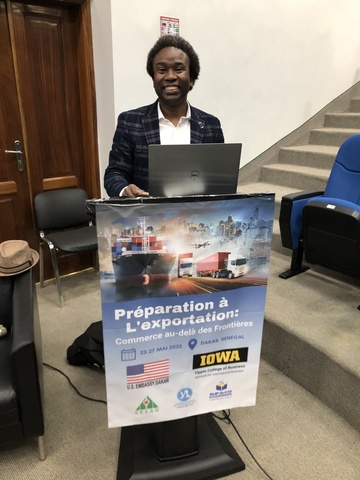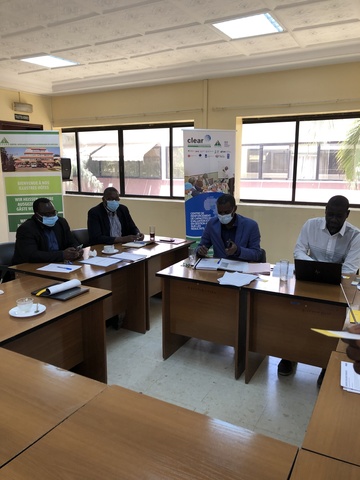The University of Iowa has a long-standing commitment to partnering alongside global leaders in education to further expand opportunities for students to develop and grow as globally minded individuals. That tradition continues as International Programs and the UI College of Education extend and deepen partnerships with schools in Senegal, located in western Africa.

“We are looking to build collaborations with schools in Senegal, with a focus on faculty interactions and student interactions that look at co-curricular development opportunities, both in undergraduate and graduate programs,” said Russ Ganim, associate provost and dean of International Programs.
In the most recent trip, Ganim; Will Coghill-Behrends, clinical associate professor of multilingual education in the UI College of Education; Dimy Doresca, director of the Institute for International Business in the Tippie College of Business; and Amira Nash, associate director of partnerships and programs in the UI Linda R. Baker Teacher Leader Center, visited two international business schools in Dakar, CESAG (African Center for Higher Studies in Management) and the École Supérieure de Commerce, to discuss partnerships between the schools and the University of Iowa. During the trip, the Memorandum of Understanding with CESAG was renewed with a pledge to develop reciprocal programming between the institutions with focus on curricular development.
“Many of the fastest growing economies in the world are in sub-Saharan Africa,” stated Ganim. “This is a great educational opportunity for our university, and for our students, to build on the connections being established in Senegal and the rest of Africa, and make sure we are giving our students every opportunity to learn about a fascinating part of the world.”
Furthermore, the group visited two international primary and secondary education schools, the Dakar Academy and the Senegalese American Bilingual School. There, they met with staff to discuss the University of Iowa’s curriculum, research opportunities, and social experiences their students could participate in as international students if they chose to attend the University of Iowa.
“In education, we want to look at opportunities for future teachers and our graduate students in the college to travel, work, study, conduct research, and broaden their skill set with partners in Senegal,” said Coghill-Behrends.
During the visit, discussions centered around developing teacher training opportunities that could include short-term training over a two-to-three-week period in Dakar, with reciprocal training for teachers from Senegal visiting Iowa City. With natural intersections between global education and diversity, equity, and inclusion initiatives, the partnerships in Africa are critical to the university and its global mission.
“We see the international world, the global community, as key to understanding our mission, purpose, and function in diversity, equity, and inclusion,” said Coghill-Behrends. “There is a lot of value in encouraging our students to think about how many of the concepts and constructs they encounter as they mature as practitioners around things like identity, race, racism, and gender, they’re conceived so differently across the globe. Global partnerships allow us to better understand ourselves when we look at these things from a global perspective.”

“Many of the fastest growing economies in the world are in sub-Saharan Africa,” stated Ganim. “This is a great educational opportunity for our university, and for our students, to build on the connections being established in Senegal and the rest of Africa, and make sure we are giving our students every opportunity to learn about a fascinating part of the world.”
Moving forward, next steps for partnerships in Africa include visits to Ghana and Nigeria in fall 2022. In Senegal specifically, continued conversations with administration at the Dakar Academy to construct and implement faculty and student interactions between the academy and the University of Iowa are ongoing.
“We are working to establish action plans with institutions in Senegal that focus on faculty and student interactions, co-curricular development, and teacher training for students in the College of Education,” said Ganim. “We would like to see global classroom situations developed, where undergraduate and graduate students in both locations take courses in common, and finish with a capstone experience with a couple weeks spent in each country. We’ve done this in the College of Business, and I think we could do this in the College of Education, too, to further expand and develop globally minded students.”